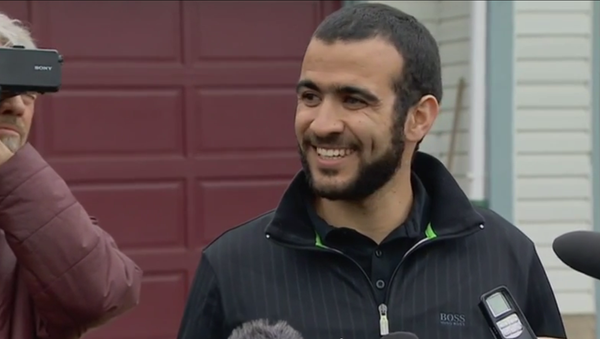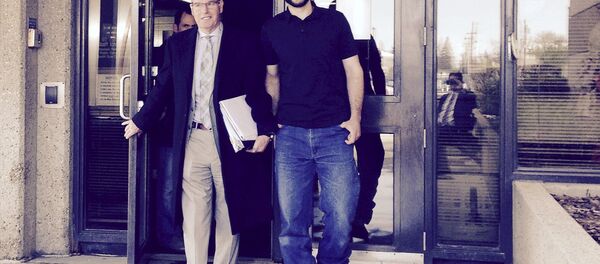The Toronto native and former child soldier was held in custody since 2002, accused — and ultimately convicted — of throwing a grenade in Afghanistan that killed an American soldier. He was subsequently imprisoned at Bagram Prison, then transferred to Guantanamo Bay, where Khadr says that interrogators forced a false confession and plea deal through eight years of torture.
Khadr was transferred back to Canada in 2010 after being sentenced by an American military tribunal and has been freed on bail as he appeals the conviction. He was serving his time at Bowden Institution at the time of his release.
On May 8, Khadr was all smiles as he was released on bail, getting his first taste of freedom in 13 years, pending an appeal of his conviction.
Chief Justice Beverley McLachlin, who was hearing the arguments stated that it came down to statutory interpretation. Khadr was sentenced by a United States military tribunal to eight years in prison for murder, which is below the Canadian minimum for murder, therefore his sentencing will only work in the Canadian judicial system if he is treated as though he was sentenced as a juvenile.
The federal government was seeking to have him serve five concurrent eight year sentences.
"We are of the view that a proper interpretation of the relevant legislation does not permit Mr. Khadr's eight-year sentence to be treated as five distinct eight-year sentences to be served concurrently." McLachlin told the court.
"I come to the conclusion… Mr. Harper is a bigot," Dennis Edney, Khadr’s lawyer told the press after the ruling. "Mr. Harper doesn't like Muslims and there's evidence to show that."
Since Khadr is out on bond, the ruling is only meaningful if Khadr violates his bail conditions. Should he be reincarcerated, this ruling states that he could be held in a provincial facility instead of a federal prison.
If Khadr’s statements last week as he flashed a big bright smile were true however, it is highly unlikely that will be an issue. Khadr has stated he aims to prove the Harper administration is wrong about him and that he is a good person. “There’s nothing I can do about the past but I can do something about the future,” he stated after his release.
Thursday’s ruling marks the third time the Supreme Court has sided with Khadr. In 2008 they ruled that Canadian officials broke the law when sharing information about him with his Guantanamo Bay captors and in 2012 they ruled that his constitutional rights were violated when Canadian agents interviewed him in Guantanamo, despite knowing about his torture.




